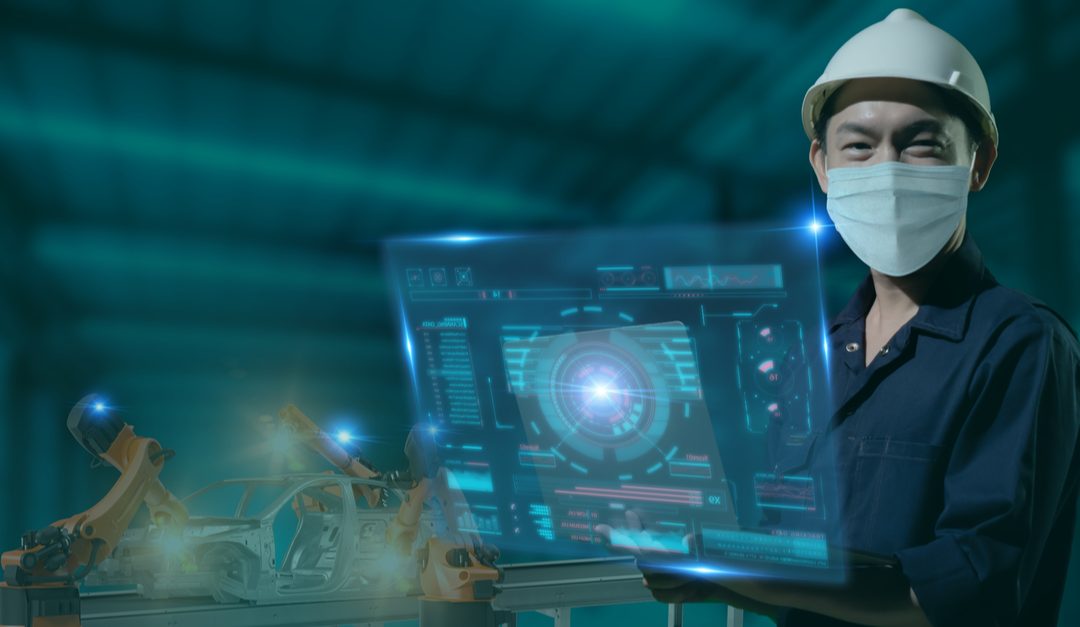Smart Technology and the New Normal in Manufacturing
COVID-19 has had a significant impact on all industries and one that has been heavily affected is the manufacturing sector. With disruption and delays to shipments, a rise in demand for essential items and in some cases immediate closures due to lockdown, organisations have had to adjust to a new normal.
As the lockdown begins to be moderately lifted, now is the time when businesses need to reconsider their return to work policies, with many introducing regular temperature checks and compulsory PPE on site. One thing is clear – emerging technologies will play a vital role in helping the industry as it continues to adapt and restart operations.
Smart, digital technologies will be essential to prepare for the challenges ahead and adapting to new ways of operating. In fact, the global size of the smart manufacturing technology industry is estimated to grow from $181 billion in 2020 to $220 by 2025. In this blog, we discuss how Industry 4.0 and smart connected manufacturing is paving the way for the new normal of the post-pandemic world.
Smart solutions in Manufacturing
COVID-19 has provided the impetus for manufacturing companies to embrace the adoption of digital solutions. Here are some areas where technology is impacting working practices:
1. Smart Sanitising Solutions
Developing and implementing an effective sanitising programme is vital to enable manufacturing plants to open whilst ensuring the safety of all workers. Smart technology provides an easy way to ensure that these policies are properly carried out.
Now Signage has developed an advanced LCD Hand Sanitiser Station which ensures that hand sanitiser dispensers are never empty. The ‘Dispenser Management’ app monitors sanitiser usage and sends automatic notifications to your account to notify you when your dispenser is running low or requires a refill of sanitiser.
Hygiene control is not only important for personnel, but also Panel PCs and touchscreens being used across manufacturing plants. Wincomm’s Smart Hygiene Control Solutions feature stainless steel housing that is resistant to bacterial growth, capable of withstanding daily high pressure wash-downs and fully sealed waterproof, dust proof casing for easy cleaning.
2. Infrared (FLIR) Cameras
Body temperature monitoring and altering has become a first line of defence against COVID-19 in the workplace. However, using hand-held infrared thermometers at close range can put testers at risk.
Technology such as forward-looking infrared (FLIR) cameras can detect a person’s temperature from a distance for non-intrusive screening at scale. Employers can then execute policies, such as isolating those with elevated temperatures for testing with a thermometer.
3. Automation Solutions
Exploring automation solutions allows manufacturing plants to decrease worker density on the factory floor. Smart automation solutions could include autonomous materials movement such as forklifts, cranes and drones, or the automation of repetitive tasks such as stock assembly using industrial robotics.
Red Lion’s industrial automation and networking solutions can also help manufacturers – both large and small – connect, monitor, and control operations.
For example, Red Lion’s ProducTVity Station is a ready-to-deploy plant floor visual management system that displays real-time Key Performance Indicator (KPI) data and Andon messages on large televisions to drive efficiency, giving visual tools of how the production line is preforming.
Using a built-in library of over 300 industrial protocols, the ProducTVity Station can connect to almost any plant floor equipment to help improve process improvement. Easily configured with Crimson® 3.0 software in just a few minutes, it can deliver unmatched visibility into process and equipment performance in manufacturing environments.
In addition to this, Red Lion’s FlexEdge™ Intelligent Edge Automation Platform allows tasks to be carried out offsite by web-enabling remote processes.
Personnel can act on real-time data from virtually any equipment, anywhere. It will seamlessly connect new and existing equipment, minimise downtime and experience frictionless, future-proof scalability.
4. Digital Twins
Finally, the use of simulation technology to produce digital twins of a manufacturing environment allows business owners to safely experiment with different scenarios, such as production line configuration or different staggered shift patterns, to evaluate the outcomes on employee safety and productivity, without the human and financial risks of experimenting in real life.
It is clear that reviving the manufacturing industry after such unprecedented challenges will not an easy task. However, through exploring smart manufacturing solutions, can not only ensure the safety of their workers and their production efficiency, but also propel their business into the next generation of Industry 4.0, which will reap benefits in both the short- and long-term future.
For more details on our partners and smart technology solutions, click here.

